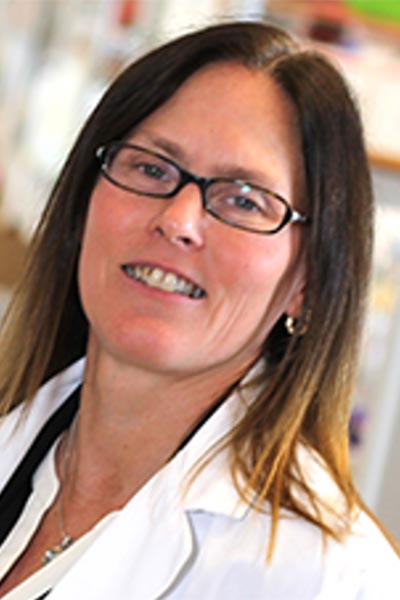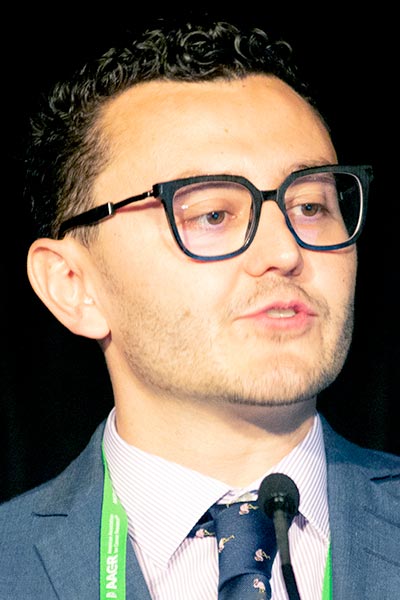Researchers are harnessing the microbiome to modulate treatment response
“You are what you eat” is more than a catchy aphorism. In cancer treatment response, it is the literal truth: Altering the composition of the gut microbiome can change response to some chemotherapy and immunotherapy regimens, and altering the tumor microbiome can have similar effects on cancer treatments.

“We have known for more than a decade that you can improve treatment effects by manipulating the tumor microbiome,” said Jennifer A. Wargo, MD, MMSc, MD Anderson Cancer Center. “We now know that you can change a checkpoint blockade nonresponder to a responder by altering the gut microbiome.”
Wargo and two other researchers discussed the latest efforts using microbes to promote cancer response on Monday, April 11, during the session Understanding Microbe-Tumor Interactions in Health and Disease: From Basic Mechanisms to Applied Microbial-Based Cancer Therapy. The session can be viewed on the virtual platform by registered meeting participants through July 13, 2022.
Microbes are pervasive in the environment and living organisms, Wargo noted. Humans hold about 20,000 genes and up to 20 million microbial genes. The microbiomes containing those genes are inherently modifiable, and some microbes play active roles in human health and disease.
P-glycoprotein (P-gp) is a primary regulator of the inflammatory diarrhea seen in salmonella infection as well as other pathogenic bacteria, inflammatory bowel disease, lung cancer, Lyme disease-associated arthritis, psoriasis, and other diseases. P-gp also acts as a multidrug efflux transporter that reduces intracellular concentrations of toxic xenobiotics—including chemotherapy agents—contributing to treatment resistance. And the expression of P-gp is modulated by intestinal microbiota.

“Bacteria make the best scientists,” said session chair Beth McCormick, PhD, University of Massachusetts Chan School of Medicine.
Loss of P-gp is associated with intestinal inflammation, she explained. Some taxa are associated with increased expression of the protein by generating short-chain fatty acids and secondary bile acids from the fermentation of dietary fiber, contributing to homeostasis.
Broad-spectrum antibiotics can decimate the microbiome, reducing P-gp protein and contributing to diarrhea. So can infection with salmonellatyphimurium, suggesting a novel approach to cancer therapy, McCormick said.
Some cancer cells upregulate the expression of P-gp during carcinogenesis, using P-gp efflux transporter activity to eliminate chemotherapeutic agents to protect tumor cells. P-gp overexpression is associated with poor prognosis in acute myeloid leukemia and diffuse large B-cell lymphoma.
Her research showed that Salmonella typhimurium infection can prevent P-gp protein expression in the intestinal apical surface. Based on this, in a humanized primary breast cancer model, combining salmonella nano-bugs developed in her lab with doxorubicin showed increased activity of doxorubicin compared to combining verapamil with doxorubicin.

“The microbiome has emerged as one of the hallmarks of cancer,” said Bertrand Routy, MD, PhD, Université de Montréal, Canada. “The microbiome profile is associated with immunotherapy response.”
Akkermansia muniphilia bacteria are a potential prognostic marker for anti-PD-1 sensitivity in patients with non-small cell lung cancer (NSCLC), Routy continued. Patients with high levels of the bacteria do not respond well, he said.
Recent data also suggest that patients who are on or will receive anti-PD-1 agents should minimize the use of broad-spectrum antibiotics before immunotherapy. Antibiotic therapy can lead to microbiome dysbiosis, reducing the effectiveness of immunotherapy.
On the positive side, camu-camu berries (Myrciaria dubia), a Latin American rainforest shrub, provide an additive effect to anti-PD-1 therapy in preclinical models, Routy said.
“But the future of cancer is not in a berry,” he said. “We have identified castalagin polyphenol as the active ingredient, which shifts the microbiota composition and systemic metabolite profile to promote CD8+ T-cell infiltration. A clinical trial is opening in three weeks in NSCLC.”
MD Anderson is conducting multiple microbiome projects and trials through PRIME-TR, its Program for Innovative Microbiome and Translational Research. One of the early findings is that patients who receive broad-spectrum antibiotic treatment have impaired response to chimeric antigen receptor T-cell therapy.
“Gut and tumor microbes impact immunity via numerous mechanisms, such as tertiary lymphoid structures (TLS),” Wargo said. “Efforts to target gut microbes to improve response to cancer treatment are proving to be effective. If patients have TLS in tumors, they are more likely to respond. And it is possible to change the microbiome to increase TLS and improve treatment response.”
In addition to supplementation with live bacteria and fecal microbiota transplantation, simply adding fiber to the diet can make a difference in treatment response, she continued. Patients on a diet containing at least 20 g of fiber daily do better on anti-PD-1 therapy.
Observational studies at MD Anderson have found a linear association between dietary fiber and cancer treatment response. Multiple clinical trials combining dietary interventions with more familiar chemotherapy, immunotherapy, and other therapies are underway.
More from the AACR Annual Meeting 2025
View a photo gallery of scenes from Chicago, continue the conversation on social media using the hashtag #AACR25, and read more coverage in AACR Annual Meeting News.

